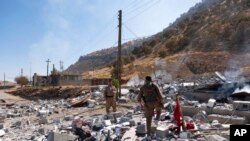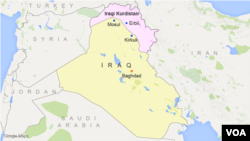Officials in Iraqi Kurdistan say casualties from Iran’s missile and drone attacks in the region have risen to at least nine deaths and 32 injuries.
“The Iranian Islamic regime, by attacking the headquarters of Kurdistan freedom forces, is seriously attempting to divert the attention of people away from the revolution that is currently under way in Iran and East [Iranian] Kurdistan,” Khalid Azizi, the spokesperson of the opposition group Kurdistan Democratic Party of Iran (KDPI), told VOA.
“This was expected, given the major damage the regime has suffered due to the civil movement inside Iran. It is the regime’s longstanding strategy that whenever it faces a threat from inside, it makes a crisis in Yemen, Iraq, Lebanon, Syria, or somewhere else,” added Azizi, who spoke at party headquarters in Koy Sinjaq, a town some 60 kilometers east of Erbil, where Iranian missiles left four KDPI fighters dead.
Iranian officials have denied the claim that the protests are a revolution, accusing the United States of supporting "rioters" to destabilize the Islamic Republic.
"Washington is always trying to weaken Iran's stability and security although it has been unsuccessful," Iran's Foreign Ministry spokesperson Nasser Kanaani said.
VOA Kurdish stringers in the region reported similar attacks against the Iranian Kurdish Komala Party in Zirguez, about 15 kilometers outside of Sulaymaniyah, and the Kurdistan Freedom Party in Altun Kupri, some 40 kilometers north of Kirkuk.
Hussain Yazdanpana, head of Kurdistan Freedom Party, told VOA that the attack in Altun Kupri was conducted via 10 explosives-laden drones that targeted 10 of their bases, leaving at least three Peshmerga fighters killed.
Yazdanpana said, “So far, three Peshmergas have been confirmed martyred, but the number will likely go up when more bodies are recovered from rubble.”
Reactions
Iran’s state-run IRNA news agency confirmed the attacks, saying the country’s Revolutionary Guard targeted “terrorists” in Iraq with “precision missiles” and “suicide drones.”
The attacks have provoked strong condemnations outside Iran, with Iraq's Foreign Ministry saying it will summon the Iranian ambassador to deliver a diplomatic complaint.
The Kurdistan Regional Government has asked the federal government in Baghdad to “fulfil its obligation of defending the country’s sovereignty.”
In a statement, the United Nations mission in Iraq said the attacks need to cease “immediately,” adding that “rocket diplomacy is a reckless act with devastating consequences.”
U.S. State Department spokesperson Ned Price said the United States “strongly” condemns the attacks, which he described as “an unjustified violation of Iraqi sovereignty and territorial integrity.”
Iran has blamed Kurdish opposition groups of inciting chaos in the country by encouraging more anti-government protests in Kurdish cities and increasing militant activities on the Iran-Iraq border.
On Saturday, the Revolutionary Guards launched an artillery attack on the Kurdish militant bases on the border, causing no civilian casualties.
Speaking to VOA, Azizi, denied Iranian claims that the Kurdish opposition was behind the unrest in the predominantly Kurdish cities of western Iran.
“What is happening in East Kurdistan and Iran is a spontaneous civil movement. … The Kurdistan Democratic Party of Iran has acted responsibly,” Azizi said. “The presence of our Peshmerga forces in the border region has in no way been to threaten or attack Iran.”
Azizi added, “We have repeatedly said the protests in Iran are civil and should continue in a peaceful way.”
Anti-veil protests
The attacks targeting Iranian Kurdish militant groups in Iraq come as unrest continues across Iran over the death of 22-year-old Mahsa Amini, a Kurdish woman.
According to data shared by Iranian state TV, at least 41 protesters and police have been killed, and more than 1,400 demonstrators were arrested during clashes across the country.
However, some Iranian human rights activists and journalists say the actual casualty figure is much higher.
Jila Mustajir, a member of Iranian Kurdish rights group Hengaw Organization for Human Rights, told VOA that more than 1,000 people have been arrested in Kurdish cities, with the Iranian security forces “completely militarizing” the city of Saqqez, where Amini is from.
“Schools in Saqqez have been controlled by Iranian security forces, causing a delay in the start of a new school year. The forces are also in control of hospitals, which has prevented injured protesters from receiving treatment,” Mustajir told VOA.
This story originated in VOA’s Kurdish Service.





